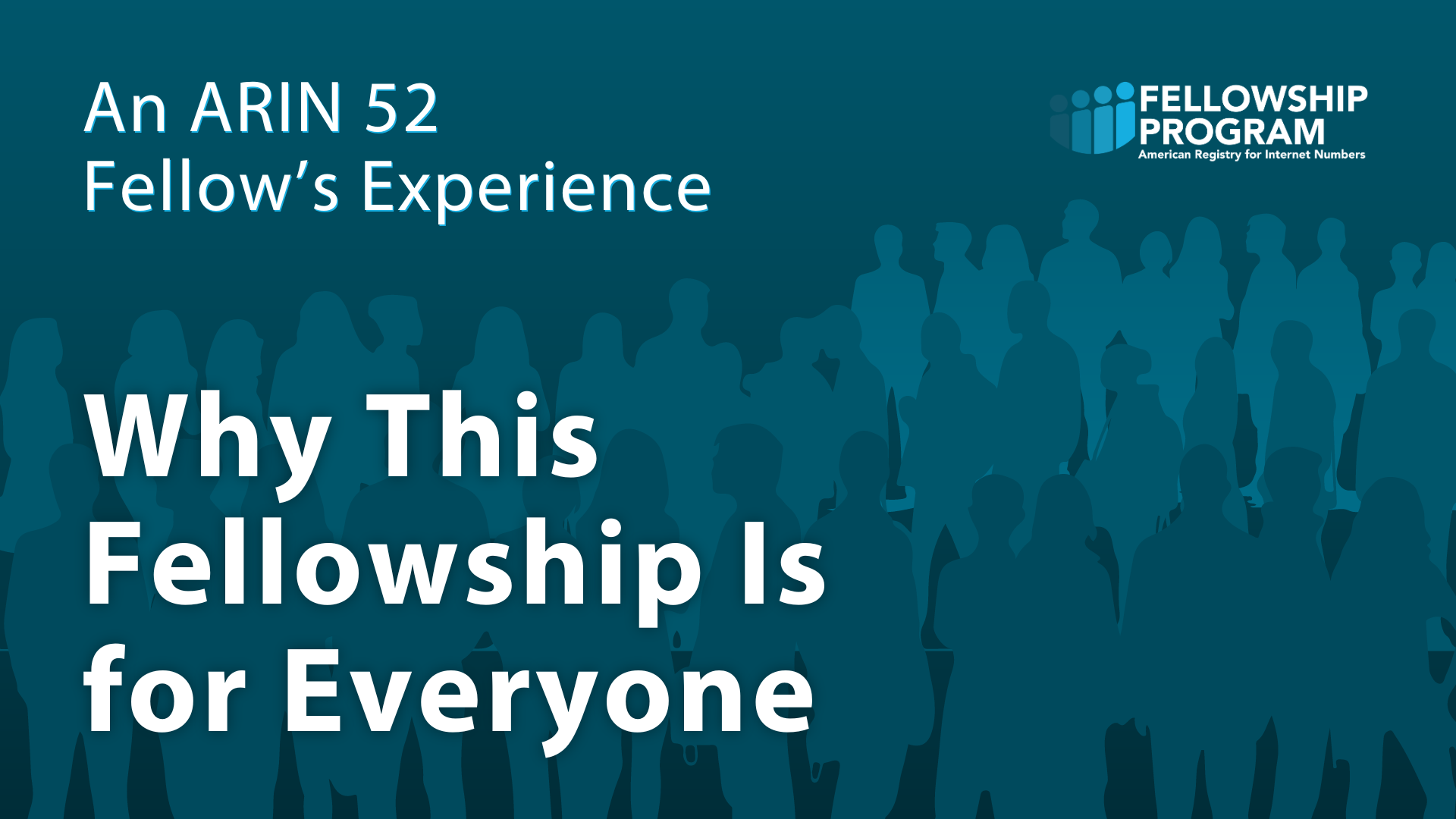
An ARIN Fellow’s Experience: Why This Fellowship Is for Everyone
This summer, after umming and ahing for a couple years, I decided to apply for the ARIN Fellowship Program. I’m so glad I did! And now I’m pleased to be able to share my experience with the process and how the ARIN 52 meeting proceeded. A note about my personality to bear in mind as you read on: I’m generally introverted and discreet, tending not to open discussions with people I meet until I feel comfortable with them.
Selection
To get to the point, I was privileged to be selected as an ARIN Fellow for the ARIN 52 Public Policy and Members Meeting. I remember the email I received once I was chosen by the Selection Committee, and I was thrilled and surprised to be selected. I had mostly forgotten about the application as I was caught up in a lot of work and juggling many things simultaneously.
I was initially selected as a virtual Fellow (meaning I would attend the meeting remotely by participating via the Zoom platform), but, by a stroke of luck for me, I ended up being granted the opportunity to attend the meeting in person. After the necessary documentation changes and some administrative gymnastics — namely flights, hotels, the Electronic System for Travel Authorization (ESTA) U.S. Visa application, and invoking my dual nationality — I was all booked and ready to head to San Diego in October.
The Application
It is important to mention the application process to highlight why you should apply even if you feel you don’t know anything about or have anything to bring to ARIN and its community. That’s not correct! The community is very open and welcoming and wants as diverse a range of stakeholders as possible, including those who are not necessarily “tech” people.
The process is simple and takes place through the SurveyMonkey Apply platform, which is very well designed to make it easy to apply. You don’t need to complete everything in one sitting; you can start, walk away, and come back to complete it at any time. I found this to be a valuable aspect of the process, as it gives you time to think about and structure your responses before submitting them.
You won’t be asked anything too personal, but you do have to provide some background on your experience and explain why you would like to be a Fellow. You should also consider how you will participate in the ARIN meeting and future community activities should you be selected. For example, I leaned on the fact that I am based in the French West Indies, a group of countries that are both Caribbean, and in the ARIN region, while also being European. This unique perspective was, I felt, valuable to explore — especially since I hadn’t noticed any interest or participation from the French-speaking islands in past meetings.
Onboarding and Pre-meeting Sessions
Once the Selection Committee selected this meeting’s participants, ARIN conducted a thorough and helpful onboarding process that clarified the timeline of Fellowship requirements and activities and started building a sense of community among the Fellows. We received regular emails about what was happening and when and what to expect. I have been participating in tech conferences across the United States for the last 15 years, and I have never had such a good experience before the conference even started — hats off to the ARIN Fellowship team for their efforts.
We participated in a couple virtual sessions on Zoom, during which we got to meet each other, learn more about the meeting, and, crucially, learn about ARIN, its number resource policies, and the entire process of bringing a policy proposal to fruition and ultimately (for some) to inclusion in the Number Resource Policy Manual (NRPM), aka the “nurrpum.”
If I had one suggestion, it would be to include in these pre-meeting sessions a demo of the process an ARIN customer goes through to gain, use, and relinquish Internet number resources. I would have found it helpful in understanding some of the proposed policy changes that could affect how a customer uses and manages their resources.
We were encouraged to join the ARIN Announce mailing list and the Public Policy Mailing List (PPML) to stay up to date with news and policy discussions. The PPML helped give me a better appreciation of the work members of the ARIN community do. There are more people involved than you might think!
Other aspects of the pre-meeting program that I appreciated were the emphasis on getting to know other Fellows and the mentorship. I was paired with ARIN Advisory Council Member Alicia Trotman, who was very welcoming, informative, and always available to discuss any questions or thoughts. However, my interactions with Mentors didn’t stop with her. All the Mentors had a wealth of knowledge and experience with ARIN and were happy to share that with anyone. During the meeting, I was able to discuss topics with other mentors, again always finding them to be open and willing to take the time to discuss anything on my mind.
The ARIN Meeting
The ARIN meeting itself ran pretty much as I expected. There were several presentations, including some ARIN operations and progress reporting (financials, projects, etc.), and then there was time in the afternoon of the first day dedicated to policy discussion. The ARIN team prepared a printed policy discussion guide ahead of the event to help us — and anyone interested in having more information — get up to speed on each policy proposal on the agenda.
None of the proposals discussed at this meeting were at a stage (Recommended Draft) where votes would occur, so the format was more about feedback. Community members had the opportunity to stand up and speak at the mic or share a question or comment through the Zoom webinar platform if they were participating virtually. The moderators were excellent at soliciting feedback from remote participants, ensuring there was plenty of time for them to be included, either verbally or by typing into the Q&A section in Zoom. Getting back to the discussions, some are certainly not shy, unlike myself, and there was plenty of dialogue both for and against the proposals.
What is interesting is that sometimes, even the most innocuous proposal can affect the use of resources, perhaps even negatively. The open format during the policy blocks allows for the necessary discussion to avoid proposals with potential adverse effects being recommended for and adopted into the NRPM.
As a bonus for attending in person, I also had the chance to participate in the North American Network Operators’ Group’s conference, NANOG 89, held at the same venue just prior to ARIN 52. This was a fantastic opportunity to network with subject-matter experts on all things network-related. I gained several great contacts and will continue discussing topics I am working on with them over the coming months and years. One security expert even agreed to do a short presentation for my university students studying IT and cybersecurity.
The Takeaway
If I have anything to say in conclusion, it is “don’t hesitate to apply.” Even if you think you’re not directly related to the main focus of ARIN, it will be a valuable experience that will expand your knowledge of how the Internet actually runs. You’ll meet some great people, and, if you put in a little effort like me, you’ll come away with a couple new friends and great resources for your career.
I look forward to the next meeting and am looking into how I can contribute further to the ARIN community. If I want the Internet to exist as open as possible, I need to put in the work and contribute to influencing it that way.
Any views, positions, statements, or opinions of a guest blog post are those of the author alone and do not represent those of ARIN. ARIN does not guarantee the accuracy, completeness, or validity of any claims or statements, nor shall ARIN be liable for any representations, omissions, or errors contained in a guest blog post.
Recent blogs categorized under: Fellowship Program
GET THE LATEST!
Sign up to receive the latest news about ARIN and the most pressing issues facing the Internet community.
SIGN ME UP →Blog Categories
ARIN Bits • Tips • Updates • Elections • Caribbean • Outreach • Security • RPKI • Public Policy • Guest Post • Grant Program • Fellowship Program • Data Accuracy • IPv6 • Business Case for IPv6 • Internet Governance • Training • IPv4 • Customer Feedback • IRR



